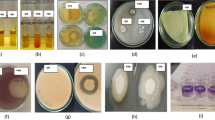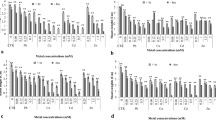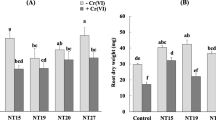Abstract
Tailings from the Zeïda mining region, located in the Middle Atlas Mountains of Morocco, contain high levels of lead and zinc which have many adverse effects, regarding both the environment and the health of the local human population. Finding practical methods to limit heavy metal dispersion and subsequent pollution of ecosystems in this area is therefore critical. This study aims to evaluate lead-tolerant rhizobacteria with an aim of exhibiting multiple plant growth-promoting traits. Thus, the growth of Medicago sativa may be improved and its resistance under lead stress conditions and may be subsequently used for the phytostabilization of lead-contaminated soils. Forty bacteria were isolated from the rhizospheric soil of Astragalus armatus plants growing wildly in the Zeïda mine tailings. After preventing the duplicates of obtained isolates, the resistance to various heavy metals at high levels allowed the selection of two strains (i.e. AaR114 and AaR72). These strains were evaluated in vitro for characteristics that promote plant development, such as the synthesis of 1-aminocyclopropane-1-carboxylic acid deaminase, indoleacetic acid, hydrogen cyanide, siderophore, phosphate solubilization, and antifungal activity. Inoculation of M. sativa plants with rhizobacteria AaR114 and AaR72, in the presence of 100 μg mL−1 of lead-acetate, was shown to significantly improve plant tolerance, increase aerial and root biomass, and diminished the negative impacts of heavy metals on plants. The 16S rRNA sequences analyses of the bacteria revealed that the strains AaR114 and AaR72 were linked to Bacillus subtilis DSM 10 T and Neobacillus niacini NBRC 15566 T, respectively.





Similar content being viewed by others
References
Agarwal M, Dheeman S, Dubey RC, Kumar P, Maheshwari D, Bajpai VK (2017) Differential antagonistic responses of Bacillus pumilus MSUA3 against Rhizoctonia solani and Fusarium oxysporum causing fungal diseases in Fagopyrum esculentum moench. Microbiol Res. https://doi.org/10.1016/j.micres.2017.08.012
Ahmad F, Ahmad I, Khan MS (2008) Screening of free-living rhizospheric bacteria for their multiple plant growth promoting activities. Microbiol Res 163:173–181. https://doi.org/10.1016/j.micres.2006.04.001
Ahsan MT, Najam-ul-haq M, Idrees M, Ullah I, Afzal M (2017) Bacterial endophytes enhance phytostabilization in soils contaminated with uranium and lead. Int J Phytoremediation 19:937–946. https://doi.org/10.1080/15226514.2017.1303813
Altschul SF, Gish W, Miller W, Myers EW, Lipman DJ (1990) Basic local alignment search tool. J Mol Biol 215:403–410. https://doi.org/10.1016/S0022-2836(05)80360-2
Ames, B.N., 1966, Assay of inorganic phosphate, total phosphate and phosphatases, In: Methods in enzymology, complex carbohydrates. Academic Press, https://doi.org/10.1016/0076-6879(66)08014-5
Anandaraj B, Delapierre LRA (2010) Studies on influence of bioinoculants (Pseudomonas fluorescens, Rhizobium sp., Bacillus megaterium) in green gram. J Biosci Technol 1:95–99
Babu AG, Shea PJ, Sudhakar D, Jung I-B, Oh B-T (2015) Potential use of Pseudomonas koreensis AGB-1 in association with Miscanthus sinensis to remediate heavy metal(loid)-contaminated mining site soil. J Environ Manage 151:160–166. https://doi.org/10.1016/j.jenvman.2014.12.045
Bakker AW, Schippers BOB (1987) Microbial cyanide production in the rhizosphere in relation to potato yield reduction and Pseudomonas spp-mediated plant growth-stimulation. Soil Biol Biochem 19(4):451–457
Beneduzi A, Ambrosini A, Passaglia LMP (2012) Plant growth-promoting rhizobacteria (PGPR): their potential as antagonists and biocontrol agents. Genet Mol Biol 35:1044–1051
Bennis M, Perez-Tapia V, Alami S, Bouhnik O, Lamin H, Abdelmoumen H, Bedmar EJ, Missbah El Idrissi M (2022) Characterization of plant growth-promoting bacteria isolated from the rhizosphere of Robinia pseudoacacia growing in metal-contaminated mine tailings in eastern Morocco. J Environ Manage 304:114321. https://doi.org/10.1016/j.jenvman.2021.114321
Blake C, Christensen MN, Kovács ÁT (2021) Molecular aspects of plant growth promotion and protection by Bacillus subtilis. Mol. Plant-Microbe Interact® 34:15–25. https://doi.org/10.1094/MPMI-08-20-0225-CR
Borriss R (2015) Bacillus, a plant-beneficial bacterium. In: Lugtenberg B (ed) Principles of plant-microbe interactions. Springer international publishing, Cham, pp 379–391
Broughton WJ, Dilworth MJ (1971) Control of leghaemoglobin synthesis in snake beans. Biochem J 125:1075–1080. https://doi.org/10.1042/bj1251075
Cappuccino, J.G., Welsh, C.T., 2017. Microbiology: a Laboratory manual, Global Edition. Pearson Education
Cedeño-García GA, Gerding M, Moraga G, Inostroza L, Fischer S, Sepúlveda-Caamaño M, Oyarzúa P, Cedeño-García GA, Gerding M, Moraga G, Inostroza L, Fischer S, Sepúlveda-Caamaño M, Oyarzúa P (2018) Plant growth promoting rhizobacteria with ACC deaminase activity isolated from Mediterranean dryland areas in Chile: effects on early nodulation in alfalfa. Chil J Agric Res 78:360–369. https://doi.org/10.4067/S0718-58392018000300360
Chen L, Beiyuan J, Hu W, Zhang Z, Duan C, Cui Q, Zhu X, He H, Huang X, Fang L (2022) Phytoremediation of potentially toxic elements (PTEs) contaminated soils using alfalfa (Medicago sativa L.): a comprehensive review. Chemosphere 293:133577. https://doi.org/10.1016/j.chemosphere.2022.133577
Chrouqi L, Lahcen O, Jadrane I, Koussa T (2017) Screening of soil rhizobacteria isolated from wheat plants grown in the Marrakech region (Morocco, North Africa) for plant growth promoting activities. JMES 8:3382–3390
Dapul H, Laraque D (2014) Lead Poisoning in children. Adv Pediatr 61:313–333. https://doi.org/10.1016/j.yapd.2014.04.004
Dias YN, da Silveira Pereira WV, da Costa MV, de Souza ES, Ramos SJ, do AmaranteCamposFernandes CBWEOAR (2022) Biochar mitigates bioavailability and environmental risks of arsenic in gold mining tailings from the eastern Amazon. J Environ Manage 311:114840. https://doi.org/10.1016/j.jenvman.2022.114840
Dworkin M, Foster JW (1958) Experiments with some microorganisms which utilize ethane and hydrogen. J Bacteriol. https://doi.org/10.1128/jb.75.5.592-603.1958
El Faiz A, Duponnois R, Winterton P, Ouhammou A, Meddich A, Boularbah A, Hafidi M (2015) Effect of different amendments on growing of Canna indica L. Inoculated with AMF on mining substrate. Int J Phytoremediation 17:503–513. https://doi.org/10.1080/15226514.2014.950408
El Hachimi ML, El Founti L, Bouabdli A, Saïdi N, Fekhoui M, Tassé N (2007) Pb et As dans des eaux alcalines minières : contamination, comportement et risques (mine abandonnée de Zeïda, Maroc). Rev Sci Eau J Water Sci 20:1–13. https://doi.org/10.7202/014903ar
El Hachimi ML, Bouabdli A, Fekhaoui M (2013) Les rejets miniers de traitement : caractérisation, capacité polluante et impacts environnementaux, mine Zeïda, mine Mibladen, Haute Moulouya (Maroc). Déchets Sci Tech 63:32–42. https://doi.org/10.4267/dechets-sciences-techniques.2567
El Khalil H, El Hamiani O, Bitton G, Ouazzani N, Boularbah A (2008) Heavy metal contamination from mining sites in South Morocco: Monitoring metal content and toxicity of soil runoff and groundwater. Environ Monit Assess 136:147–160. https://doi.org/10.1007/s10661-007-9671-9
Etesami H, Maheshwari DK (2018) Use of plant growth promoting rhizobacteria (PGPRs) with multiple plant growth promoting traits in stress agriculture: action mechanisms and future prospects. Ecotoxicol Environ Saf 156:225–246. https://doi.org/10.1016/j.ecoenv.2018.03.013
Felici C, Vettori L, Giraldi E, Forino LMC, Toffanin A, Tagliasacchi AM, Nuti M (2008) Single and co-inoculation of Bacillus subtilis and Azospirillum brasilense on Lycopersicon esculentum: Effects on plant growth and rhizosphere microbial community. Appl Soil Ecol 40:260–270. https://doi.org/10.1016/j.apsoil.2008.05.002
Gan CD, Chen T, Yang JY (2020) Remediation of vanadium contaminated soil by alfalfa (Medicago sativa L.) combined with vanadium-resistant bacterial strain. Environ Technol Innov 20:101090
Glick BR (2010) Using soil bacteria to facilitate phytoremediation. Biotechnol Adv 28:367–374. https://doi.org/10.1016/j.biotechadv.2010.02.001
Gokarn K (2010) Siderophores and pathogenecity of microorganisms. J. Biosci. Tech 1(3):127–134
Gordon SA, Weber RP (1951) Colorimetric estimation of indoleacetic acid. Plant Physiol 26:192–195. https://doi.org/10.1104/pp.26.1.192
Hachimi MLE, Fekhaoui M, Abidi AE, Rhoujatti A (2014) Contamination des sols par les métaux lourds à partir de mines abandonnées : le cas des mines Aouli-Mibladen-Zeïda au Maroc. Cah. Agric. 23(1):213–219. https://doi.org/10.1684/agr.2014.0702
Hachimi, M., 2016. Impact d’un site minier abandonné sur l’environnement : cas de la mine de Zeïda (Haute Moulouya, Maroc). https://doi.org/10.13140/RG.2.1.4715.6086
He CQ, Tan GE, Liang X, Du W, Chen YL, Zhi GY, Zhu Y (2010) Effect of Zn-tolerant bacterial strains on growth and Zn accumulation in Orychophragmus violaceus. Appl Soil Ecol 44:1–5. https://doi.org/10.1016/j.apsoil.2009.07.003
He H, Ye Z, Yang D, Yan J, Xiao L, Zhong T, Yuan M, Cai X, Fang Z, Jing Y (2013) Characterization of endophytic Rahnella sp. JN6 from Polygonum pubescens and its potential in promoting growth and Cd, Pb Zn uptake by Brassica Napus. Chemosphere 90:1960–1965. https://doi.org/10.1016/j.chemosphere.2012.10.057
Helaoui S, Boughattas I, Hattab S, Mkhinini M, Alphonse V, Livet A, Bousserrhine N, Banni M (2020) Physiological, biochemical and transcriptomic responses of Medicago sativa to nickel exposure. Chemosphere 249:126121. https://doi.org/10.1016/j.chemosphere.2020.126121
Jacobson C, Pasternak J, Glick B (2011) Partial purification and characterization of 1-aminocyclopropane-1-carboxylate deaminase from the plant growth promoting rhizobacterium Pseudomonas putida GR12-2. Can J Microbiol 40:1019–1025. https://doi.org/10.1139/m94-162
Joseph B, Patra RR, Lawrence R (2007) Characterization of plant growth promoting rhizobacteria associated with chickpea (Cicer arietinum L.). Int J Plant Prod 1(2):141–152
Joshi R (2018) A review of Fusarium oxysporum on its plant interaction and industrial use. J Med Plants Stud 6:112–115. https://doi.org/10.22271/plants.2018.v6.i3b.07
Kisiel A, Kępczyńska E (2016) Medicago truncatula Gaertn. as a model for understanding the mechanism of growth promotion by bacteria from rhizosphere and nodules of alfalfa. Planta 243:1169–1189. https://doi.org/10.1007/s00425-016-2469-7
Kong, Z., Glick, B.R., 2017. The role of plant growth-promoting bacteria in metal phytoremediation, In: Advances in microbial physiology. Elsevier, 97–132
Koptsik GN (2014) Problems and prospects concerning the phytoremediation of heavy metal polluted soils: a review. Eurasian Soil Sci 47:923–939. https://doi.org/10.1134/S1064229314090075
Kumar NR, Arasu VT, Gunasekaran P (2002) Genotyping of antifungal compounds producing plant growth-promoting rhizobacteria, Pseudomonas fluorescens. Curr Sci 82:1463–1466
Kumar S, Stecher G, Tamura K (2016) MEGA7: molecular evolutionary genetics analysis version 7.0 for bigger datasets. Mol Biol Evol 33:1870–1874. https://doi.org/10.1093/molbev/msw054
Kumar, A., Singh, V.K., Tripathi, V., Singh, P.P., Singh, A.K., 2018. Plant growth-promoting rhizobacteria (PGPR): perspective in agriculture under biotic and abiotic stress, in: Crop improvement through microbial biotechnology. Elsevier, pp. 333–342. https://doi.org/10.1016/B978-0-444-63987-5.00016-5
Lamin H, Alami S, Bouhnik O, ElFaik S, Abdelmoumen H, Bedmar EJ, Missbah-El Idrissi M (2019) Nodulation of retama monosperma by ensifer aridi in an abandonned lead mine soils in Eastern Morocco. Front Microbiol. https://doi.org/10.3389/fmicb.2019.01456
Li Q, Xing Y, Fu X, Ji L, Li T, Wang J, Chen G, Qi Z, Zhang Q (2021) Biochemical mechanisms of rhizospheric Bacillus subtilis-facilitated phytoextraction by alfalfa under cadmium stress: microbial diversity and metabolomics analyses. Ecotoxicol Environ Saf 212:112016. https://doi.org/10.1016/j.ecoenv.2021.112016
Liu G, Tao L, Liu X, Hou J, Wang A, Li R (2013) Heavy Metal speciation and pollution of agricultural soils along Jishui River in non-ferrous metal mine area in Jiangxi Province. China J Geochem Explor 132:156–163. https://doi.org/10.1016/j.gexplo.2013.06.017
López ML, Peralta-Videa JR, Benitez T, Gardea-Torresdey JL (2005) Enhancement of lead uptake by alfalfa (Medicago sativa) using EDTA and a plant growth promoter. Chemosphere 61:595–598. https://doi.org/10.1016/j.chemosphere.2005.02.028
Ma Y, Prasad MNV, Rajkumar M, Freitas H (2011) Plant growth promoting rhizobacteria and endophytes accelerate phytoremediation of metalliferous soils. Biotechnol Adv 29:248–258. https://doi.org/10.1016/j.biotechadv.2010.12.001
Ma Y, Rajkumar M, Zhang C, Freitas H (2016) Beneficial role of bacterial endophytes in heavy metal phytoremediation. J Environ Manage 174:14–25. https://doi.org/10.1016/j.jenvman.2016.02.047
Manoj SR, Karthik C, Kadirvelu K, Arulselvi PI, Shanmugasundaram T, Bruno B, Rajkumar M (2020) Understanding the molecular mechanisms for the enhanced phytoremediation of heavy metals through plant growth promoting rhizobacteria: a review. J Environ Manage 254:109779. https://doi.org/10.1016/j.jenvman.2019.109779
Mohamed HI, Gomaa EZ (2012) Effect of plant growth promoting Bacillus subtilis and Pseudomonas fluorescens on growth and pigment composition of radish plants (Raphanus sativus) under NaCl stress. Photosynthetica 50:263–272. https://doi.org/10.1007/s11099-012-0032-8
Muleta D, Assefa F, Granhall U (2007) In vitro antagonism of rhizobacteria isolated from Coffea arabica L. against emerging fungal coffee pathogens. Eng Life Sci 7:577–586. https://doi.org/10.1002/elsc.200700004
Nagajyoti PC, Lee KD, Tvm S (2010) Heavy metals, occurrence and toxicity for plants: a review. Environ Chem Lett 8:199–216. https://doi.org/10.1007/s10311-010-0297-8
Navarro-Torre S, Barcia-Piedras JM, Caviedes MA, Pajuelo E, Redondo-Gómez S, Rodríguez-Llorente ID, Mateos-Naranjo E (2017) Bioaugmentation with bacteria selected from the microbiome enhances Arthrocnemum macrostachyum metal accumulation and tolerance. Mar Pollut Bull 117:340–347. https://doi.org/10.1016/j.marpolbul.2017.02.008
Noori F (2018) Mining alfalfa (Medicago sativa L.) nodules for salinity tolerant non-rhizobial bacteria to improve growth of alfalfa under salinity stress. Ecotoxicol Environ Saf 162:129–138
Pikovskaya R (1948) Mobilization of phosphorus in soil in connection with vital activity of some microbial species. Mikrobiologiya 17:362–370
Rabindran R, Vidhyasekaran P (1996) Development of a formulation of Pseudomonas fluorescens PfALR2 for management of rice sheath blight. Crop Prot 15:715–721. https://doi.org/10.1016/S0261-2194(96)00045-2
Rajkumar M, Ae N, Prasad MNV, Freitas H (2010) Potential of siderophore-producing bacteria for improving heavy metal phytoextraction. Trends Biotechnol 28:142–149. https://doi.org/10.1016/j.tibtech.2009.12.002
Raklami A, Oufdou K, Tahiri A-I, Mateos-Naranjo E, Navarro-Torre S, Rodríguez-Llorente ID, Meddich A, Redondo-Gómez S, Pajuelo E (2019) Safe cultivation of Medicago sativa in metal-polluted soils from semi-arid regions assisted by heat- and metallo-resistant PGPR. Microorganisms 7:212. https://doi.org/10.3390/microorganisms7070212
Raklami A, Oubane M, Meddich A, Hafidi M, Marschner B, Heinze S, Oufdou K (2021) Phytotoxicity and genotoxicity as a new approach to assess heavy metals effect on Medicago sativa L.: Role of metallo-resistant rhizobacteria. Environ Technol Innov. https://doi.org/10.1016/j.eti.2021a.101833
Raklami A, Tahiri A, Bechtaoui N, Abdelhay EG, Pajuelo E, Baslam M, Meddich A, Oufdou K (2021b) Restoring the plant productivity of heavy metal-contaminated soil using phosphate sludge, marble waste, and beneficial microorganisms. J Environ Sci 99:210–221. https://doi.org/10.1016/j.jes.2020.06.032
Rebello S, Sivaprasad MS, Anoopkumar AN, Jayakrishnan L, Aneesh EM, Narisetty V, Sindhu R, Binod P, Pugazhendhi A, Pandey A (2021) Cleaner technologies to combat heavy metal toxicity. J Environ Manage 296:113231. https://doi.org/10.1016/j.jenvman.2021.113231
Rodríguez L, Ruiz E, Alonso-Azcárate J, Rincón J (2009) Heavy metal distribution and chemical speciation in tailings and soils around a Pb–Zn mine in Spain. J Environ Manage 90:1106–1116. https://doi.org/10.1016/j.jenvman.2008.04.007
Rosier A, Medeiros FHV, Bais HP (2018) Defining plant growth promoting rhizobacteria molecular and biochemical networks in beneficial plant-microbe interactions. Plant Soil 428:35–55. https://doi.org/10.1007/s11104-018-3679-5
Saeid A, Prochownik E, Dobrowolska-Iwanek J (2018) Phosphorus solubilization by bacillus species. Molecules 23:2897. https://doi.org/10.3390/molecules23112897
Saitou N, Nei M (1987) The neighbor-joining method: a new method for reconstructing phylogenetic trees. Mol Biol Evol 4:406–425. https://doi.org/10.1093/oxfordjournals.molbev.a040454
Schindler M, Santosh M, Dotto G, Silva LFO, Hochella MF (2021) A review on Pb-bearing nanoparticles, particulate matter and colloids released from mining and smelting activities. Gondwana Res. https://doi.org/10.1016/j.gr.2021.07.011
Schwyn B, Neilands JB (1987) Universal chemical assay for the detection and determination of siderophores. Anal Biochem 160:47–56. https://doi.org/10.1016/0003-2697(87)90612-9
Sehrawat A, Sindhu SS, Glick BR (2022) Hydrogen cyanide production by soil bacteria: Biological control of pests and promotion of plant growth in sustainable agriculture. Pedosphere 32:15–38. https://doi.org/10.1016/S1002-0160(21)60058-9
Shah AA, Yasin NA, Akram K, Ahmad A, Khan WU, Akram W, Akbar M (2021) Ameliorative role of Bacillus subtilis FBL-10 and silicon against lead induced stress in Solanum melongena. Plant Physiol Biochem 158:486–496. https://doi.org/10.1016/j.plaphy.2020.11.037
Shin D, Kim J, Kim B, Jeong J, Lee J (2015) Use of phosphate solubilizing bacteria to leach rare earth elements from monazite-bearing ore. Minerals 5:189–202. https://doi.org/10.3390/min5020189
Spaepen S, Vanderleyden J, Remans R (2007) Indole-3-acetic acid in microbial and microorganism-plant signaling. FEMS Microbiol Rev 31:425–448. https://doi.org/10.1111/j.1574-6976.2007.00072.x
Suman J, Uhlik O, Viktorova J, Macek T (2018) Phytoextraction of heavy metals: a promising tool for clean-up of polluted environment? Front Plant Sci 9:1476
Tak HI, Ahmad F, Babalola OO (2013) Advances in the application of plant growth-promoting rhizobacteria in phytoremediation of heavy metals. In: Whitacre DM (ed) Reviews of environmental contamination and toxicology, vol. 223. Springer, New York, pp 33–52. https://doi.org/10.1007/978-1-4614-5577-6_2
Tirry N, Tahri Joutey N, Sayel H, Kouchou A, Bahafid W, Asri M, El Ghachtouli N (2018) Screening of plant growth promoting traits in heavy metals resistant bacteria: prospects in phytoremediation. J Genet Eng Biotechnol 16:613–619. https://doi.org/10.1016/j.jgeb.2018.06.004
Vassilev N, Vassileva M, Nikolaeva I (2006) Simultaneous P-solubilizing and biocontrol activity of microorganisms: potentials and future trends. Appl Microbiol Biotechnol 71:137–144. https://doi.org/10.1007/s00253-006-0380-z
Versalovic J, Schneider M, Bruijn FJD, Lupski JR (1994) Genomic fingerprinting of bacteria using repetitive sequence-based polymerase chain reaction. Methods Mol Cell Biol 5:25–40
Walia A, Mehta P, Chauhan A, Shirkot CK (2014) Effect of bacillus subtilis strain CKT1 as inoculum on growth of tomato seedlings under net house conditions. Proc Natl Acad Sci India Sect B Biol Sci 84:145–155. https://doi.org/10.1007/s40011-013-0189-3
Wani AL, Ara A, Usmani JA (2015) Lead toxicity: a review. Interdiscip Toxicol 8:55–64. https://doi.org/10.1515/intox-2015-0009
Wu FY, Bi YL, Leung HM, Ye ZH, Lin XG, Wong MH (2010) Accumulation of As, Pb, Zn, Cd and Cu and arbuscular mycorrhizal status in populations of Cynodon dactylon grown on metal-contaminated soils. Appl Soil Ecol 44:213–218. https://doi.org/10.1016/j.apsoil.2009.12.008
Xiong PP (2018) Medicago sativa L. enhances the phytoextraction of cadmium and zinc by Ricinus communis L. on contaminated land in situ. Ecolog Eng 116:61–66
Yahaghi Z, Shirvani M, Nourbakhsh F, Pueyo JJ (2019) Uptake and effects of lead and zinc on alfalfa (Medicago sativa L.) seed germination and seedling growth: role of plant growth promoting bacteria. South Afr J Bot 124:573–582
Yan A, Wang Y, Tan SN, Mohd Yusof ML, Ghosh S, Chen Z (2020) Phytoremediation: a promising approach for revegetation of heavy metal-polluted land. Front Plant Sci 11:359. https://doi.org/10.3389/fpls.2020.00359
Zhang H, Sun Y, Xie X, Kim M-S, Dowd SE, Paré PW (2009) A soil bacterium regulates plant acquisition of iron via deficiency-inducible mechanisms. Plant J 58:568–577. https://doi.org/10.1111/j.1365-313X.2009.03803.x
Zhang M, Shao L, Jones T, Hu Y, Adams R, BéruBé K (2022) Hemolysis of PM10 on RBCs in vitro: an indoor air study in a coal-burning lung cancer epidemic area. Geosci Front 13:101176. https://doi.org/10.1016/j.gsf.2021.101176
Zulfiqar U, Farooq M, Hussain S, Maqsood M, Hussain M, Ishfaq M, Ahmad M, Anjum MZ (2019) Lead toxicity in plants: impacts and remediation. J Environ Manage 250:109557. https://doi.org/10.1016/j.jenvman.2019.109557
Acknowledgements
The authors want to thank all the persons who contributed to the achievement of this work. This work was supported by the Moroccan ministry of Higher Education and Scientific research within the frame of PPR2 2015/5 project “Utilisation des biotechnologies microbiennes et Végétales pour la réhabilitation des sites miniers abandonnés” (BOMIVER).
Funding
Mounia Bakkali Bouarrakia was granted a fellowship from the Moroccan Ministry of National Education, Vocational Training, Higher Education, and Scientific Research within the frame of the “Priority projects for scientific research and technological development, PPR2/2015/5.
Author information
Authors and Affiliations
Contributions
MBB conducted the experimentations, acquired and analyzed the data, wrote the original draft, and contributed to the final version of the paper, AE contributed to software and analyzed the data and methodology, OE contributed to methodology and analyzed the data, MHZ contributed to writing—review and methodology, AL acquired the funding, MB acquired the funding, and AA acquired the funding, supervision, and validation.
Corresponding author
Ethics declarations
Conflict of interest
The authors declare that they have no conflict of interest.
Additional information
Editorial responsibility: J. Chen.
Supplementary Information
Rights and permissions
Springer Nature or its licensor (e.g. a society or other partner) holds exclusive rights to this article under a publishing agreement with the author(s) or other rightsholder(s); author self-archiving of the accepted manuscript version of this article is solely governed by the terms of such publishing agreement and applicable law.
About this article
Cite this article
Bakkali Bouarrakia, M., Elyemlahi, A., El Galiou, O. et al. Single and dual inoculation with rhizobacteria on alfalfa (Medicago sativa L.) growth under lead stress conditions. Int. J. Environ. Sci. Technol. 20, 9767–9778 (2023). https://doi.org/10.1007/s13762-022-04669-9
Received:
Revised:
Accepted:
Published:
Issue Date:
DOI: https://doi.org/10.1007/s13762-022-04669-9





